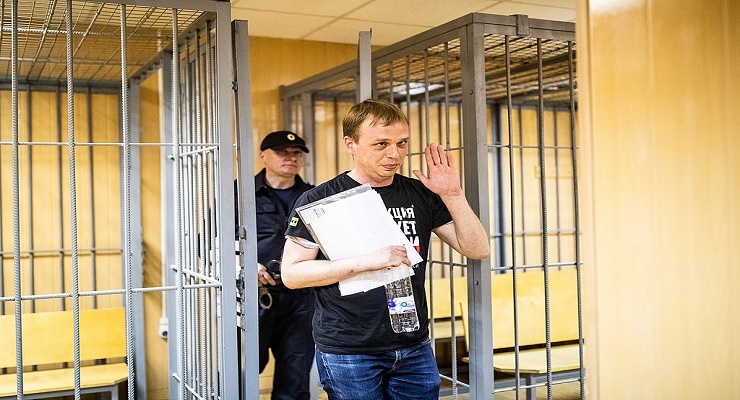
From Voice Of America
The Russian authorities don’t often climb down in the face of street protests and a media outcry, but the freeing last week of the dogged investigative journalist Ivan Golunov, who was arrested on trumped up drug charges, has buoyed liberal opponents of Vladimir Putin’s Kremlin.
They hope things don’t go back to normal and that the Golunov case marks the start at the very least of a new push for change, the beginning of a more powerful public backlash over public corruption and rights abuses and a readiness to go toe-toe with the authorities.
The Kremlin rarely intervenes when lower-level officials overstep the mark, say analysts, but the strength of the public outcry over the journalist’s arrest clearly rattled top aides, who fear a burgeoning mood for protest, prompted by years of declining incomes and the brazen lining of pockets by the rich and powerful, say civil-society activists.
Top government officials moved speedily to distance the Kremlin and President Putin, whose poll ratings have been flagging of late, from the arrest of the reporter, who writes for the Latvia-based independent Russian news-outlet Meduza. The outlet bases in the Baltic state to get around censorship challenges, although most of its reporters live in Russia.
The “outrage in response to the violent arrest of Russian anti-corruption journalist Ivan Golunov has caused the Russian authorities to cave,” tweeted Bill Browder, the American-born financier who has campaigned to expose high-level corruption in Russia.
Golunov was formally released on June 11 after being held on charges of drug possession and distribution.
Protest snowballed when it became clear that the evidence against him was fabricated and the drugs planted. Even the judge in the case was unconvinced, ordering him to be moved from jail, where he sustained injuries from police beatings, his supporters say, and placed under house arrest instead. Some local media are reporting that Anton Vaino, a top Putin aide, was instrumental in the judge’s decision.
The country’s state-owned television channels came out in support of the detained journalist, after, again according to local reports, Kremlin approval.
With tests showing none of Golunov’s DNA was on the drugs, Moscow police admitted that photographs they posted of what they claimed was his drugs lab weren’t taken in the journalist’s apartment, as previously claimed. The police themselves are now under investigation; the head of the Department for Narcotics Control as well as the head of the Moscow Police Department have been fired by the Kremlin along with two deputy ministers at the country’s Interior Ministry.
Golunov’s arrest appeared to have been conducted by corrupt police tied to businessmen unmasked in his grainy exposés of what activists call the “submerged state,” involving dubious public projects and the embezzlement of state funds. Golunov’s most recent exposé focused on how state officials, gangsters and the police have carved up Moscow’s funeral business.
His release has prompted civil-society celebrations. But while the confidence of pro-democracy activists has been boosted, some observers doubt it will mark a thaw or usher in a new respect for rights. “It is far too early to speak of a ‘thaw,’ according to The Bell, an independent news-outlet that campaigned for the charges against Golunov to be dropped. The outlet also warned that civil society solidarity remains fragile.
But some observers say the Golunov case may well be looked back upon as an important political development, a crack that has exposed the Kremlin’s inability to control the excesses of government officials, the elite and security agencies or to curtail the corruption angering ordinary Russians.
“Russians appear increasingly to be losing their patience with the status quo, and also optimistic that something about it can change,” argued Mark Galeotti, author of the book “We Need to Talk About Putin,” and an analyst at Britain’s Royal United Services Institute. “Revolutions are built on hope, not desperation, and the greatest asset for an authoritarian regime is apathy,” he says.
Putin “cannot curb the excesses and lawlessness of the elite, and as a result looks weak,” he argued in a commentary. “Politics is about perception, and to look weak is to become weak,” he says. That is likely to embolden activists and grassroots opposition and place the Kremlin more on the defensive.
The day before charges were dropped against Golunov, a court in Chechnya conditionally released a human-rights defender, Oyub Titiev, who has been held for more than a year on what his supporters say are also fabricated drug charges. Titiev’s real offense, they say, has been as a thorn in the side of the Chechen authorities.
Leave a Reply